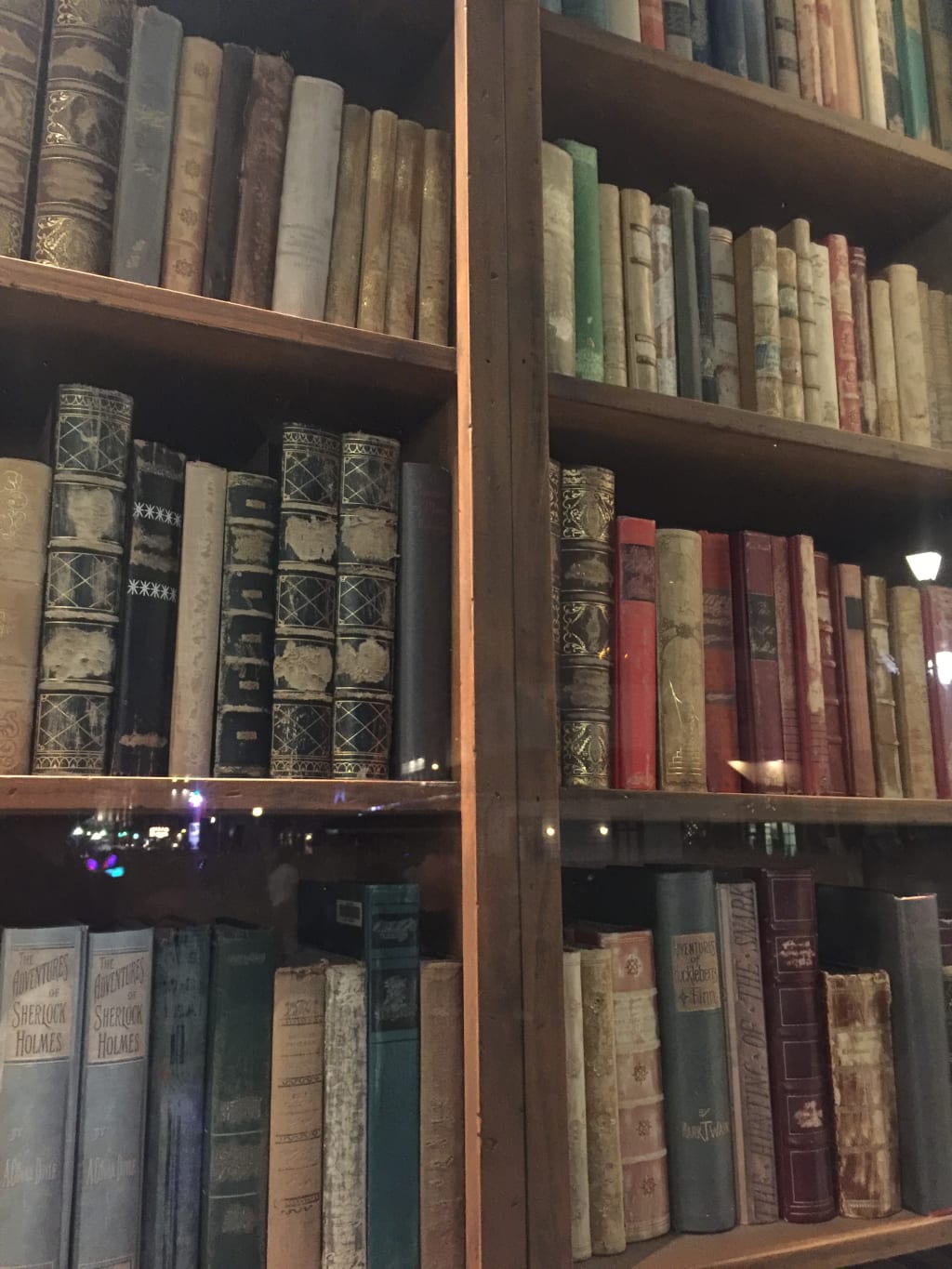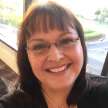
I had a choice to make in college: teach music or teach English. Both content areas resonated deep in my soul, made obvious by the elective classes I was taking at the time. My family has a musical background, from my grandmother who sang in a Latin band in Tampa named Conjunto Alegre in the 1940s. As a nurse’s aide, she also sang for her patients because she felt music would improve spirit as well as their health. My father played a Lowrey organ that accompanied his singing, and my mother listened to records as I was growing up. Both my brothers play guitar and sing in bands as well. I have played flute since 6th grade and still do; I discovered I can sing as well and play handbells. Music transcends cultures and time, and I enjoy music in different languages, genres, and time periods. My playlists vary widely depending on what I want to do – continue a sad streak, bring me out of one, build energy to accomplish a physical task, or just simply to relax. This includes Gregorian chants, jazz, country, urban pop, industrial, rock, liturgies in Latin, and neoclassical that show up on my lists. Music from the Mideast, Greece, Mexico, Cuba, Germany, Africa, Sweden – it’s an eclectic mix.
English was in my early life, too. In my childhood bedroom was my mother’s book collection; a wall full of books that I could see every moment of the day. I learned to read at an early age, and I devoured books as often as I could. When the Scholastic book fair came around, my mother told me to order whatever I wanted. As a result of so much reading, my writing was born. I started writing in 5th or 6th grade as a way of dealing with stress. At that age stress was being sent to my room or being told I wasn’t allowed to do something. The “rage” I felt at the time turned into words because my parents didn’t approve of raising voices. What does one do when feeling so upset and having no way to release a primal scream? Write. And I wrote many things.
I knew I’d become an educator, but I had to decide which avenue I would travel. I mistakenly believed that playing piano was a requirement to become a music teacher, and I found that unnerving since I learned treble clef (right hand) but not bass (left hand) instead of learning them together on a keyboard. Because of that, I wended my way into a Bachelors of English Education and left music behind.
I taught literature, vocabulary, and my favorite - writing - over the course of my career. “Why do we have to learn this?” is something nearly every teacher has heard. Students needed to know how to use words as building blocks to create pieces of art that had never been created before, not just as basic communication skills through language creation. The humanities, I explained, were the way people expressed what it’s like being human through literature, music, art, dance, sculpture, and architecture in response to questions: “Why are we here? What purpose do we serve? How are humans across the world connected?” I reminded them that studying the humanities would connect them to different ages and places. We can study Chaucer and Shakespeare and find their relevance in today’s world. We can look at authors from Japan, Scotland, and Italy to find our commonality. We are more similar than we are different.
The longer I taught, the more I read. Reading took me away from the here and now and transported me to a different realm. This came from fiction, non-fiction, dramatic works, poetry; all were refreshing new vistas with exciting new possibilities. The characters became my friends, and although we didn’t have one-on-one conversations, I felt I knew them well enough to consider them friends. One night I finished a novel (Beaches by Iris Dart) and was weeping so hard I had started to hyperventilate. I had lost a best friend in that book. A tissue box later, I fell asleep only to hear the alarm an hour later. Yes, I was reading the book until 3 am because I just had to know how the story ended. There was no way to stop. A good book will do that, and there’s no shame in that.
People don’t understand how I can also read more than one book at the same time. It’s not unusual for me to have three or four books that I’ve started and can switch between depending on my mood. It’s no different than channel surfing. The words are a soothing balm to the hard-working analytical part of my brain; grading papers written by teenagers has a way of numbing the intellect. Reading rinses that away and clears the way for the next day.
To this day I’m still surrounded by books. I have an entire wall of books in the first room you see entering my house: antiquities, complete series, novels, trivia, children’s books, humor, textbooks – the works. It wasn’t long before I ran into the problem of space. Books turned into columns and stacks and fire hazards. Faced with this dilemma, I had to invest in a Kindle for future books which I may say is a game-changer. Instant definitions, highlighting, font size changes, instant downloading of new material; this is the perfect format as my eyes age. Until, that is, one day I was reading a paper magazine and pressed on the right-hand side of the page to turn it. I hope no one saw me do that.
Along with reading, writing took hold in me. I never stopped writing. As a teacher, I wrote for classes, during classes, modeling what I expected. All the assignments I gave them I did as well, one for each period. I wrote five times a day, from essays, sonnets, introductory paragraphs, comparison/contrast papers, and all with different topics. When asked how I “can do that so fast,” I’d tell my students that it’s just who I am. It’s like breathing to me, a natural consequence of being alive. I wrote for my own enjoyment, to work through grief, to comfort others, and on commission at times.
To remain certified in the state of Florida, teachers must take in-service trainings or college classes. Being near a college gave me opportunities to take more creative writing classes, giving me more practice and feedback on my writing. It was unnerving at first to have a professor critiquing my work when he was born before I started teaching. I accepted the feedback gracefully, and I started to see the writing patterns and mistakes I’d been making in my syntax and superfluous phrasing. In groups we’d read each other’s writing, and we all grew in that aspect. It was a marvelous way to grow with respect for differences in style, word choice, and content.
The classroom abruptly changed during the pandemic, and teachers were given a proscribed curriculum, unoriginal pablum that provided students easier methods of cheating. Cheating and plagiarism are things I cannot and will not tolerate; on the first day of school for thirty-two years I’d stand on a desk and loudly say, “Do. Not. Cheat!” Not even, “Good morning, welcome to English IV” or “Hi, I’m Mrs. Dukeman. Welcome to your senior year.” I wanted them to understand perfectly how I felt about cheating. During the pandemic, however, they forgot, and I had to get creative. I completely ditched the curriculum and went off the reservation for the last semester of my career.
I did something I’d always wanted to do: have my students read my writing without knowing it was my writing (this in addition to other required standards). I concocted a backstory for an “author” who lived in New Zealand who writes pieces for teacher trainings and is prohibited from publishing per contract, etc. An elaborate ruse with enough detail to throw them off. Organization and variety were key. On Mondays I’d release a piece through our online portal, and the assignment would be due on Friday. They had to reflect on or connect to the piece, analyze literary devices, answer basic comprehension questions, or my favorite – how did the story end? What happened next? Interconnecting with them on this platform was an amazing consociation, and together we grew as both writers and readers. I revealed the true author in the last week, and they were both fooled and impressed because the formats and points of view were so different, the content varied, and the voice changed from piece to piece. “It doesn’t sound like you,” they commented. Then, I thought, how do I sound to them when I speak out loud? A nerdy teacher?
As exciting as reading and writing are to me, there was that other humanity that stayed with me always, and that was music. I played flute for school events and concert accompaniments, for weddings, for church, for fun. I still sing a lot, enough to annoy those in my household or car, captive audiences both. Too bad, I’d think to myself as I wear my noise-cancelling Beats. Listening to music carries me to different places as the words do in reading. I’m an infamous car-singer, AND I’m brave enough to roll down my window. If my singing makes someone stopped in traffic beside me laugh, just maybe I prevented a case of road rage or provided a bit of relief. Music, however, is a time-relative art that disappears as soon as it goes, leaving the echo of the phrase behind as the music progresses. The classical musical training I started with still affects how I react to music; I’m not just listening to the words, but the art of music itself – the crescendos, the melodies and harmonies, the resolutions, the collaboration of sounds, the intertwining of themes, the keys – and sometimes a small part of me regrets not going into music.
I found out years after I graduated from college that playing piano is not a pre-requisite to becoming a band director. And a little part of me died. Don’t get me wrong; I didn’t like English any less. My music still helps me get from one day to another, helping me get up in the morning, make sense of being alive, unraveling the stressors of the day, freeing me from mourning. I just wondered what it would have been like to be a band director.
And then I got a chance.
My church needed an interim director for a singing choir of about twenty people and a bell choir of about twelve. The pastor asked me if I’d like to do it because I’d been a part of that music program for many years, and I said yes without any hesitation. This short interim lasted two years, and I’d like to say it surpassed everything I thought it would be. I taught them new music, coordinated it with the designated readings and gospels, considered who could do solos and ensembles, and planned Christmas and Easter musical programs. The feeling of standing up there, getting the piano player ready, having the choir members watching my white gloved hands, and then letting them do their thing, their voices meshing the way they’d rehearsed. It was simply amazing and humbling at the same time.
I knew music would become important in the second half of my life after one day I remember well. It was a Good Friday morning, a deeply somber day before the celebration of Easter. I sang a song from Mary’s point of view, mourning the death of her Son, holding on to him and expressing her grief. It was the last song of the Tenebrae service. As I sang, the choir quietly left, the black altar paraments were removed, and the pastors retreated. When the song ended, the lights were turned down, and the congregation left silently to reflect on the message. What surprised me, however, was after the second service that day. A woman had gone to both services, she said afterwards, because my singing of that song affected her, gave her chills, and she wanted to hear me sing again.
I’d never been recognized for anything in the musical arena as an adult, and this inspired me to do more. I had more to give. I wanted to continue, but alas - all good things come to an end. The church found a permanent person for the job, and I was thanked for my help and dismissed. I didn’t want to leave that position, but it was time for me to go. The connections I made those two years helped me refocus on the purpose of music and what it can do. After the pandemic I plan on joining a community symphony or chorus to continue this endeavor. Since I’ve retired, I now have the time and resources to entertain both my loves.
How can I get these two areas to coalesce more? One way is having a playlist featuring music without words that I write to as I am doing right this very moment. My husband doesn’t understand how I can play the same music over and over, but he doesn’t have the same connection to music as I do. Music picks me up and tosses me around like a rag doll. Listening to certain lyrics can also create in me a vision of a story or poem that bounces off the words. It’s not unusual for me to write a piece influenced by and incorporating many bits of lyrics or phrases (with proper documentation or credit), allusions to literature, music, pop culture, or even my prior writing. I’ve written phrases on napkins, receipts, bills, post-it notes whenever I feel the words are significant. I’ve never tried writing music, so perhaps a keyboard is in my future. To write a song from beginning to end would tie the words and music together in a form I’ve yet to attempt. Now that I’ve got the time, it might become my next new passion.
About the Creator
Barb Dukeman
After 32 years of teaching high school English, I've started writing again and loving every minute of it. I enjoy bringing ideas to life and the concept of leaving behind a legacy.






Comments
There are no comments for this story
Be the first to respond and start the conversation.